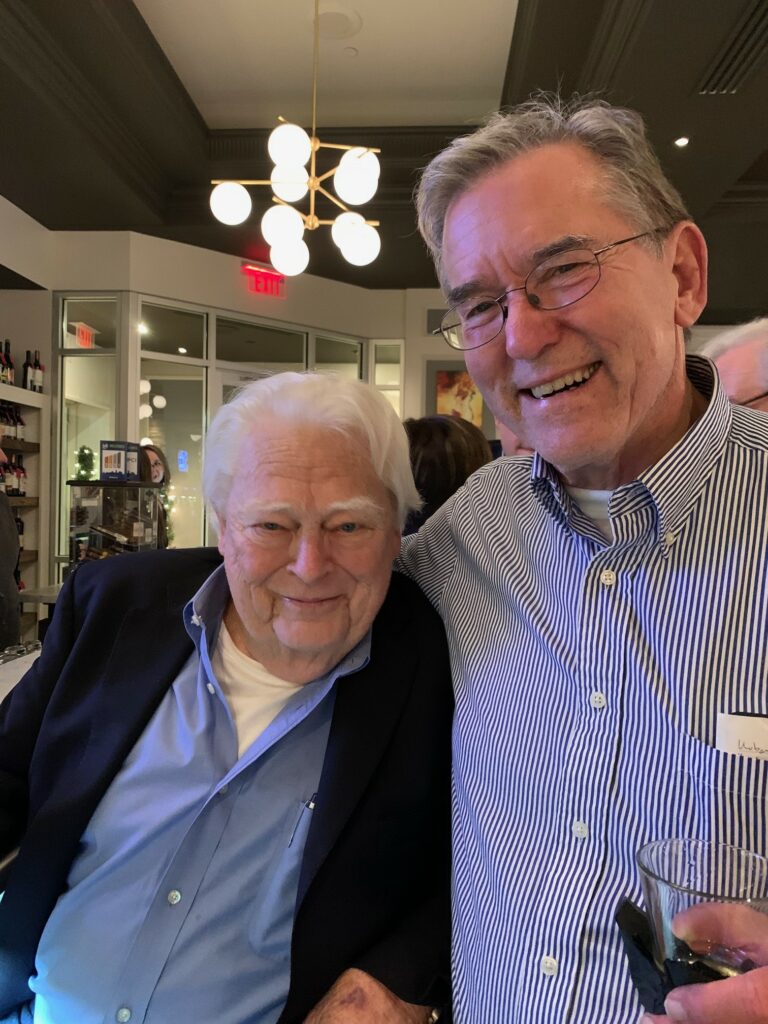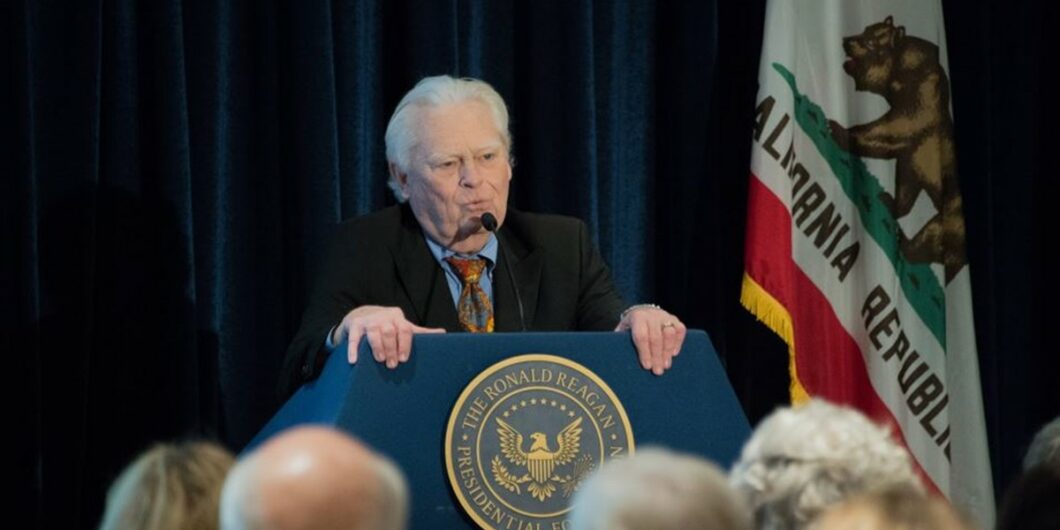Remembering Gordon Lloyd
Gordon Lloyd, retired professor in Pepperdine University’s School of Public Policy, passed away this week at the age of 81. I first met Gordon at a Liberty Fund conference on “Madison’s Notes of Debates” held at the Ambassador Hotel in Los Angeles in January 1987. In addition to the readings for the conference—the entire transcript of the notes James Madison recorded each day of the discussions and decisions at the Constitutional Convention—Gordon had a ratty yellow legal pad full of his own notations. Along the top of each page were the dates on which the delegates were in session, and along the left edge he had the names of all the delegates appointed to the Convention by the various states. His plan was to have a complete list of attendance for each day of the Convention.
When he initially showed me this chart, there were many empty spaces in the grid because he was still doing his research on this project. He was reading diaries and correspondence not only of delegates, but also of the families and friends of delegates, to determine whether they were in Philadelphia or elsewhere on each day. The official journal of the Convention was of little help in this project because votes were recorded by states, not individuals. I was impressed with the enthusiasm and energy with which he approached this project, and the status of this project became a running part of our conversations whenever we got together. While he never achieved 100% certainty, his chart was at one point made available on the Teaching American History website sponsored by the Ashbrook Center at Ashland University.
In offering a remembrance of him, I begin with this account because it shows Gordon as a dogged investigator, trying to track every piece of evidence that may be important in understanding the dynamics of the American Founding. He was also an honest broker, willing to follow the evidence wherever it led. In the conferences that we worked on together after I left teaching to become a program officer at Liberty Fund, Gordon had a few favorite questions dealing with the American Founding. One was, “Is the Constitution an empowering or a restraining document?” Another was, “Was America well-founded or ill-founded?” Gordon loved America but could see it with a clear eye. He would often inscribe books with a phrase from the Preamble, “the blessings of liberty.” Evidence for the case that America was “ill-founded” was the existence of slavery, which was the primary threat to those blessings.
As a Discussion Leader, Gordon was able to remain neutral as the conversation he had spawned raged on, with an occasional comment suggesting that the historical record always confounded ideologues who preferred stories in which the forces of good and the forces of evil were always clearly identified. Alexander Hamilton famously suggested that the decision over the Constitution would determine whether governments could be established by “reflection and choice” or would always be subject to “accident and force.” Gordon’s Convention attendance list might throw some light on the question of whether the Constitution itself is the product of only “reflection and choice” or whether a delegate’s presence or absence on a given day was an “accident” that affected the Convention’s decisions.
I will say more about Gordon as a scholar later but I must emphasize that he was a person who loved life, had a wonderful sense of humor, and was enthusiastic about at least three sports: cricket, “football” (American soccer), and hockey. Gordon was born in England, but grew up in Trinidad, where his father worked for a British oil company. In his off hours, his father was a cricket umpire who refereed three international Test matches between 1958 and 1960. During a 1960 series between England and the West Indies, 18-year-old Gordon worked as a statistician in the radio booth above the cricket field while his father served as one of two umpires for the second game.

Near the end of the game with England leading and the West Indies team batting, the other umpire called a batter out for a violation of the rules, and a riot ensued. Enraged supporters of the West Indies team began throwing bottles into the radio booth and at players still on the field. Eventually, Gordon and the broadcasters, who were hiding under a table, were brought down under police protection and escorted off the field to safety. As a daily reminder of this, Gordon framed the local newspaper with a photograph of his father being escorted away by police. Gordon routinely made three or four trips a year from Southern California to visit his mother in Wales. Much of their time together was spent watching live games featuring Manchester United, and if no live game were available, they would glory in past victories on a cable channel devoted exclusively to Man U.
Gordon never deserted his early interest in economics, and came to meld that interest with his concern for the history of political thought.
Gordon and I would occasionally attend the Southwestern Social Science Convention. One year the convention was in Fort Worth, and we were able to satisfy our intellectual needs by attending panels, our musical needs by attending Tales of Hoffman at the Fort Worth Opera, and our sports needs by catching a Fort Worth Bramhas (minor league hockey) game the next evening. At this meeting, I nudged Gordon into a practical joke. He could slide in and out of a Trinidad accent at will, and we were having lunch in a chain restaurant that offered a “Caribbean jerk chicken sandwich.” I convinced Gordon to order the sandwich in his “normal” (American) voice, and when the young waiter brought it to switch to his Caribbean accent and inform the waiter that he worked for corporate headquarters and was traveling the country to check on the quality and authenticity of the sandwiches being sold. The waiter paled, and quickly left. He returned more quickly than usual to see “how everything was,” and Gordon let him off the hook by admitting, in his American voice, he was just teasing him. We left a larger-than-usual tip and had one final laugh with the waiter on our way out.
Gordon had an interesting education. He took his bachelor’s degree in economics and politics at McGill University in Montreal and completed all his coursework for a PhD in economics at Chicago. Gordon wanted to write a dissertation on Adam Smith’s economic and political thought, but no one in the economics department was willing to supervise such a dissertation. A brief hiatus in his studies occurred when Willmoore Kendall hired him to teach economics at the University of Dallas. After one year he left Dallas for Claremont Graduate School, where he began anew and completed the coursework necessary for a doctorate in government. He received his PhD from Claremont in 1973, after authoring a dissertation on the political thought and practice of John Taylor of Caroline.
Gordon and I shared an interest in Willmoore Kendall’s thought and we edited Kendall’s correspondence with Eric Voegelin for publication in the Political Science Reviewer. We also conducted a few conferences on the cantankerous Kendall’s writing to introduce him to younger scholars. On one occasion we did an abbreviated two-session conference in which we read the opening chapter to Russell Kirk’s The Conservative Mind and Kendall’s scathing attack on Kirk. One of my favorite short, animated films is Bambi Meets Godzilla, and as the date for our conference approached, we started calling the short conference Godzilla vs. Bambi—I leave it to your imagination to determine who was Bambi and who Godzilla.
Gordon remained an active scholar to the end of his life. Among his publications, he edited the debates between Herbert Hoover and Franklin Roosevelt (The Two Faces of Liberalism) and Madison’s Debates in the Federal Convention of 1787. He co-edited with Nick Capaldi The Two Narratives of Political Economy; they then coauthored Liberty vs. Equality in Political Economy: Locke Vs. Rousseau to the Present. He has coauthored with David Davenport numerous op-ed pieces and three volumes, The New Deal and Modern American Conservatism: A Defining Rivalry, Rugged Individualism: Dead or Alive? and How Public Policy Became War, with a fourth volume, Equality of Opportunity: A Century of Debate, due out later this year.
As this listing of publications suggests, Gordon never deserted his early interest in economics, and came to meld that interest with his concern for the history of political thought. He also never lost his interest in the Founding, and even the works on twentieth-century American politics he coauthored with David Davenport are, from Gordon’s perspective, efforts to understand how the early arguments that shaped the Founding had morphed and were still under discussion today. Pepperdine’s School of Public Policy, with its dual emphasis on both normative and empirical analysis, was a perfect home for his approach to the political world. A final project, in its early stages when Gordon passed away, dealt with what he saw as Madison’s ongoing critique of slavery in the notes on the Convention.
With Gordon’s death, the world lost a wonderfully creative and thoughtful scholar. I lost a boon companion.
